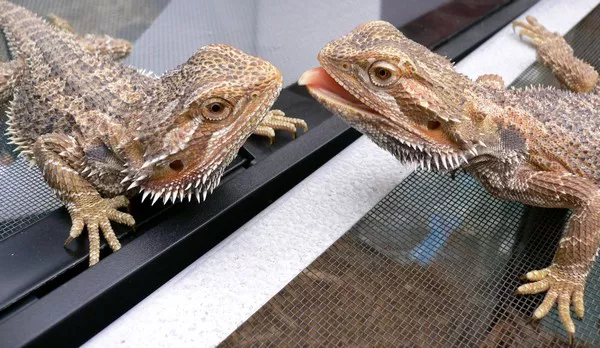Bearded dragons are popular and fascinating reptiles that make great pets for both beginners and experienced reptile keepers. As with all pets, proper nutrition is essential for the health and well-being of bearded dragons. In this article, we will explore what to feed a bearded dragon, including their dietary requirements and recommended feeding schedule.
What Do Bearded Dragons Eat?
Bearded dragons are omnivores, which means they eat both animal and plant matter. In the wild, they feed on a variety of insects, including crickets, mealworms, and roaches, as well as vegetation such as flowers, fruits, and leaves. In captivity, a balanced diet for a bearded dragon should include:
- Insects:
Bearded dragons require a high protein diet, and insects are a great source of protein. Common insects fed to bearded dragons include crickets, mealworms, waxworms, superworms, and roaches. It is important to offer insects that are appropriately sized for your bearded dragon, as well as gut-loaded insects (insects that have been fed a nutritious diet themselves) or supplemented with calcium and vitamins.
- Vegetables:
Bearded dragons require a balanced diet that includes a variety of vegetables. Some recommended vegetables include collard greens, mustard greens, turnip greens, kale, bok choy, carrots, squash, and sweet potato. It is important to offer a variety of vegetables to ensure your bearded dragon receives all the necessary nutrients.
- Fruits:
Bearded dragons can also enjoy fruits in moderation. Some recommended fruits include strawberries, blueberries, raspberries, and mango. It is important to limit the amount of fruit in the diet, as too much sugar can be harmful.
- Calcium and vitamin supplements:
Bearded dragons require calcium for proper bone development and health. Calcium supplements can be added to their food, or they can be offered a calcium supplement dusted on their insects. Vitamin supplements may also be necessary if your bearded dragon is not receiving enough through their diet.
Feeding Schedule for Bearded Dragons
Bearded dragons are popular pets due to their docile nature and unique appearance. They are also relatively easy to care for, making them a great option for first-time reptile owners. A crucial part of caring for a bearded dragon is providing a proper diet and feeding schedule. In this article, we will discuss the feeding schedule for bearded dragons and what to consider when establishing a feeding routine.
- Why Is a Feeding Schedule Important for Bearded Dragons?
A consistent feeding schedule is important for bearded dragons to maintain their health and well-being. In the wild, bearded dragons have a natural feeding schedule based on the availability of prey and vegetation. In captivity, it is up to the owner to establish a feeding routine that provides the necessary nutrients and mimics their natural diet.
Establishing a feeding schedule also helps prevent overfeeding or underfeeding, which can lead to health problems. Bearded dragons are prone to obesity and metabolic bone disease, which can be caused by a lack of proper nutrition or too much of certain nutrients. By following a feeding schedule, owners can ensure their bearded dragon is receiving the appropriate amount of food and nutrients.
- What Should a Feeding Schedule for Bearded Dragons Include?
Bearded dragons are omnivores, meaning they eat both animal and plant matter. Their diet should consist of a variety of insects, vegetables, and fruits. Younger bearded dragons require more protein and fewer vegetables, while adult bearded dragons require more vegetables and less protein. A feeding schedule should reflect this change in dietary needs as bearded dragons grow and develop.
- Establishing a Feeding Schedule for Bearded Dragons
When establishing a feeding schedule for a bearded dragon, there are several factors to consider. These include the age and size of the dragon, the type of food being offered, and the time of day the food is being offered.
Younger bearded dragons require more frequent feedings than older ones. A general rule of thumb is to feed a bearded dragon that is less than six months old twice a day, while an adult bearded dragon can be fed once a day. The size of the food should also be appropriate for the size of the bearded dragon, to prevent choking or digestive issues.
The type of food being offered should also be considered when establishing a feeding schedule. For example, insects should be offered in the morning or early afternoon when the bearded dragon is most active and likely to eat.
In conclusion, a balanced and nutritious diet is essential for the health and well-being of your bearded dragon. A diet consisting of a variety of insects, vegetables, and fruits, along with calcium and vitamin supplements as needed, will help ensure that your bearded dragon thrives. Remember to offer a variety of foods and adjust the diet as your bearded dragon grows and develops. By providing proper nutrition and care, your bearded dragon can live a long and healthy life.
Recommended reading: What Does Bearded Dragons Eat (Can and Can’t Eat)


























